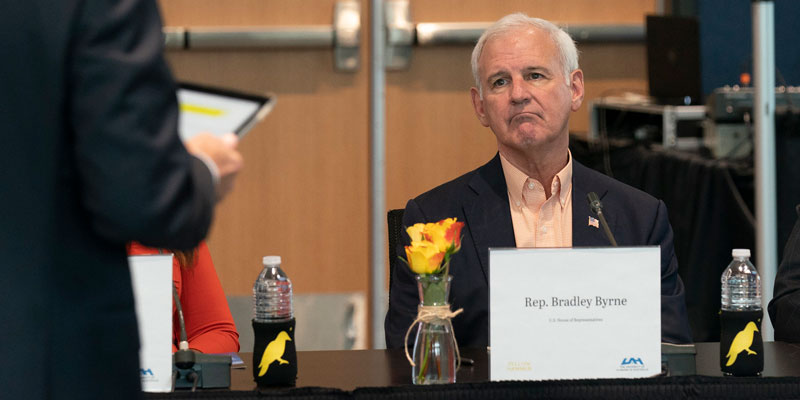The U.S. House on Friday evening passed the Families First Coronavirus Response Act in a 363-40 vote.
In a tweet on Saturday morning, President Donald Trump praised Democrats and Republicans for coming together to pass the important legislation in a resoundingly bipartisan manner.
Good teamwork between Republicans & Democrats as the House passes the big CoronaVirus Relief Bill. People really pulled together. Nice to see!
— Donald J. Trump (@realDonaldTrump) March 14, 2020
U.S. Rep. Bradley Byrne (AL-01) voted against the measure, while U.S. Rep. Mike Rogers (AL-03) was recorded as not voting. All other members of Alabama’s U.S. House delegation voted to support the bill.
In a statement released Friday night, Byrne explained why he “reluctantly voted no.”
“Tonight, I was asked to vote on a 110 page bill that spends billions of dollars and contains numerous mandates on small businesses only 26 minutes after receiving the text [of the bill],” Byrne outlined. “Although I agree with many of the provisions in this legislation, this is no way to govern.”
“We should be sending a message of calm and steady leadership in the face of this crisis, not forcing through bills in the dead of night,” he continued. “While it is critical that we continue to take actions to address the coronavirus, we should do it thoughtfully and responsibly. For that reason, I reluctantly voted no. I appreciate the Trump Administration working to greatly improve this bill over what was proposed by Speaker Pelosi. I hope that the Senate next week will engage in the due diligence that House Democrats were unwilling to do.”
The official synopsis of the bill as follows:
This bill responds to the coronavirus outbreak by providing paid sick leave and free coronavirus testing, expanding food assistance and unemployment benefits, and requiring employers to provide additional protections for health care workers.
Specifically, the bill provides FY2020 supplemental appropriations to the Department of Agriculture (USDA) for nutrition and food assistance programs, including
- the Special Supplemental Nutrition Program for Women, Infants, and Children (WIC);
- the Emergency Food Assistance Program (TEFAP); and
- nutrition assistance grants for U.S. territories.
The bill also provides FY2020 appropriations to the Department of Health and Human Services for nutrition programs that assist the elderly.
The supplemental appropriations provided by the bill are designated as emergency spending, which is exempt from discretionary spending limits.
The bill modifies USDA food assistance and nutrition programs to
- allow certain waivers to requirements for the school meal programs,
- suspend the work requirements for the Supplemental Nutrition Assistance Program (SNAP, formerly known as the food stamp program), and
- allow states to request waivers to provide certain emergency SNAP benefits.
In addition, the bill requires the Occupational Safety and Health Administration to issue an emergency temporary standard that requires certain employers to develop and implement a comprehensive infectious disease exposure control plan to protect health care workers.
The bill also includes provisions that
- establish a federal emergency paid leave benefits program to provide payments to employees taking unpaid leave due to the coronavirus outbreak,
- expand unemployment benefits and provide grants to states for processing and paying claims,
- require employers to provide paid sick leave to employees,
- establish requirements for providing coronavirus diagnostic testing at no cost to consumers,
- treat personal respiratory protective devices as covered countermeasures that are eligible for certain liability protections, and
- temporarily increase the Medicaid federal medical assistance percentage (FMAP).
Sean Ross is the editor of Yellowhammer News. You can follow him on Twitter @sean_yhn













